“Physical fitness is the foundation of national strength. We must not forget for even a moment that cultivating a strong and fit people, and making sport an everyday part of people’s lives will provide the vitality necessary for the task of modernizing the motherland.” Those words comprised a portion of President Park Chung-hee’s speech at the opening ceremony of the National Sports Festival on 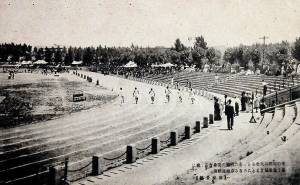 September 12, 1968. He addressed the crowd at Dongdaemun Stadium (demolished in 2008 to make way for the monstrosity that is Dongdaemun Design Plaza & Park).
September 12, 1968. He addressed the crowd at Dongdaemun Stadium (demolished in 2008 to make way for the monstrosity that is Dongdaemun Design Plaza & Park).
Park was an army man, so it is fitting to note that Dongdaemun Stadium—named Gyeongseong Stadium in 1925 by the colonizing Japanese—had been erected on a spot with considerable military significance. There, in 1882, the Imo Incident or “Soldiers’ Riot” transpired. It had previously served as the training site of the Byeolgigun, Korea’s first modern military unit. That’s not all. Shortly after the Imjin War of the late 1500s, Hadogam, part of the military camp known as 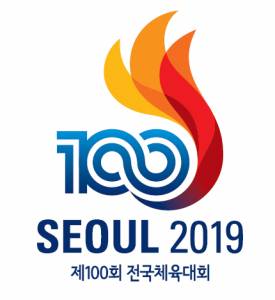 Hullyeondogam, began carrying out exercises and the standard corporal punishment.
Hullyeondogam, began carrying out exercises and the standard corporal punishment.
While Dongdaemun Stadium was the focus of the 1968 National Sports Festival, some events were held less than two kilometers south at Jangchung Gymnasium. It, too, had a martial history, although of much shorter provenance. In 1955, the government of Syngman Rhee set aside some land at the northeast corner of Namsan Park for training of soldiers and other security personnel. But by 1961 (the year Park led a military coup and commenced his 18-year reign), it had been given over to civilian purposes as architect Kim Jong-su was commissioned to design a multi-purpose, circular, steel-frame facility. Built by a Philippine engineering firm because Korea did not yet have such expertise, Jangchung Gymnasium opened in February 1963 and has served the city well for nearly 60 years. Boxing, martial arts, ssireum (Korean wrestling), basketball, volleyball, gymnastics and other 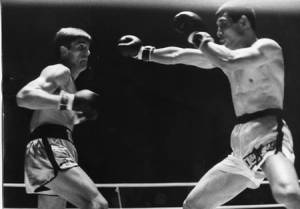 sports have been played there with regularity. It was the site of the judo and taekwondo events for the 1988 Seoul Summer Olympics. Interspersed with athletica were artistic presentations—plays, beauty pageants, concerts and so forth.
sports have been played there with regularity. It was the site of the judo and taekwondo events for the 1988 Seoul Summer Olympics. Interspersed with athletica were artistic presentations—plays, beauty pageants, concerts and so forth.
Sports historians know that on June 25, 1966, Kim Ki-su outpointed Nino Benvenuti of Italy in a 15-round split decision to win the world junior middleweight boxing championship at Jangchung Gymnasium. That sent 6,500 fans, Park among them, into ecstasy; Benvenuti thought he got robbed in favor of the local boy. Kim had taken an early lead, but by the 13th round Benvenuti was having his way. Before the 14th could start, one of the ropes in the ring mysteriously broke. Ten minutes passed before it could be repaired, enough time for Kim to gather himself and hold on for a narrow victory.
Has there ever been a more bizarre affair at Jangchung Gymnasium than what occurred on October 21, 1970? Reverend Moon Sun-myung and his wife Han Ha-jak (“true father” and “true mother,” respectively) of the Unification Church presided over a mass wedding or as he preferred to call it, a “blessing ceremony.” No 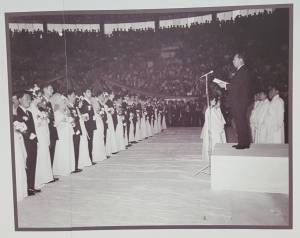 fewer than 777 couples from Korea and nine other countries tied the knot with 8,000 family members and friends looking on.
fewer than 777 couples from Korea and nine other countries tied the knot with 8,000 family members and friends looking on.
Some major political events happened there. Park had called Cheong Wa Dae home for 11 years when, in 1972, his Democratic Republican Party amended the constitution and put on an “indirect” election at Jangchung Gymnasium. An electoral college of sorts called the National Council for Unification met behind doors that were not just closed but locked. Park had hand-picked all of the 2,359 delegates and got 99.91% of the vote. Such numbers must have made his rival north of the border, Kim Il-sung, envious. The incumbent won again in 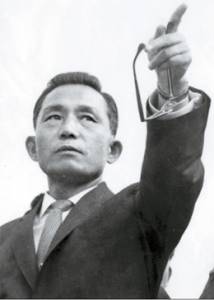 1978 using similar bogus methods. On both occasions, the atmosphere all around the gym roiled with anger.
1978 using similar bogus methods. On both occasions, the atmosphere all around the gym roiled with anger.
Fifteen months later, Park was assassinated. But the country still had a long way to go before anything like democracy could take root. In the turbulence of 1987, some of the biggest rallies, protests and confrontations between citizens and the state occurred outside of Jangchung Gymnasium.
Given additional seating twice, its capacity peaked at 10,000. The arena got plenty of use in the 1980s, 1990s and in the first decade of this century. Built solidly, its age was nonetheless showing, and local politicians talked about razing the place. If Dongdaemun Stadium could fall to the wrecking ball, surely Jangchung Gymnasium could too. Wisdom prevailed, and it was allowed to stand. A 2 ½-year, top-to-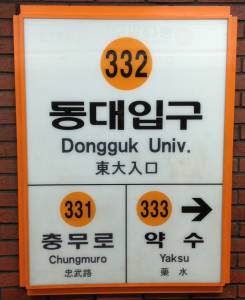 bottom renovation cost 32 billion won. Modernized, made friendly to the disabled and its seating reduced to 4,507, the renamed Jangchung Arena reopened on January 15, 2015. These days, two pro volleyball clubs (Seoul Woori Card Wibee and GS Caltex Seoul KIXX) play there.
bottom renovation cost 32 billion won. Modernized, made friendly to the disabled and its seating reduced to 4,507, the renamed Jangchung Arena reopened on January 15, 2015. These days, two pro volleyball clubs (Seoul Woori Card Wibee and GS Caltex Seoul KIXX) play there.
I was curious enough to ride the subway north to Dongguk University Station, climb the stairs of exit 5 and study it from every conceivable angle. I pondered all that had gone on there—the games, the artistry, the political chicanery and the battles on adjoining streets. I walked up a steep hill to the very fancy Shilla Hotel, then moved across to Jangchung Park, stood on 250-year-old Supgyo Bridge and looked at statues erected in honor of a couple of early 20th century Korean liberation activists (Lee Han-Eung and Kim Chang-Suk) before returning to Gangnam.

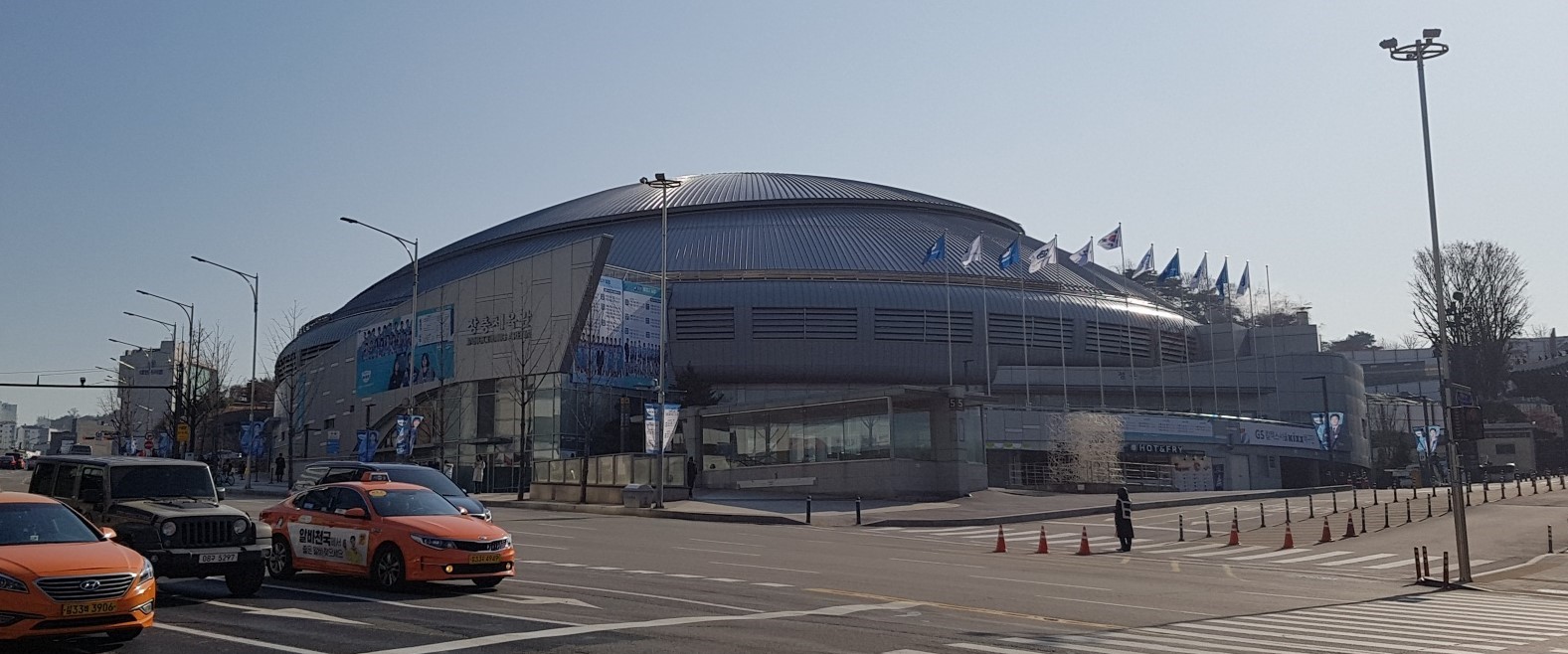
11 Comments
Awesome!
Your writings always teaches to me, more than your descriptions!
Thank you, Ison. I know it is not reading this English stuff, but it is your own history…
Excelent text abour history ,we can know many new things .
Congratulation for your blog !
Thanks, Elly. I sure learned a lot in researching this story. How about those 777 couples??? No matter how I try, I cannot understand such a “wedding.”
Hi, Richard!
Your article make me, a moderate conservative, to reminisce my country’s tumultuous history from ashes of Korean War to current economic powerhouse, from near anarchy and military dictatorship to full pledged freedom.
You always do through research when you write, consequently I think people like me will love your fascinating article of Korean history old and new.
Thanks for the story and I hope this year will be more prolific with good stories.
Ah, Matthew, if only you knew how much such words help me to carry on. It is affirmation that maybe I am doing something right (actually, I knew it before…but good to hear from a native of Korea).
Let me add one thing to the Kim-Benvenuti story. After that odd 10-minute interlude, the bell suddenly rang. Benvenuti had a towel over his head and somehow did not hear it. Kim raced across the ring and whacked Benvenuti in the nose, while he was still sitting on his bench! The referee somehow did not penalize him.
It’s just ridiculous.
Mr. Kim should have been disqualified and lost.
But Korea was still developing country at the time and ready to pull some strings for athletic achievement like boxing world championship or Olympic medals.
Oh, I miss good(?) old days.
I always learn something from your writings!
Thanks to you, a fellow Hexter Hawk, Hill Highlander and BA Cougar.
What an interesting history it is!!!
Yes indeed. I am so glad they decided to renovate rather than tear the place down.
Add Comment